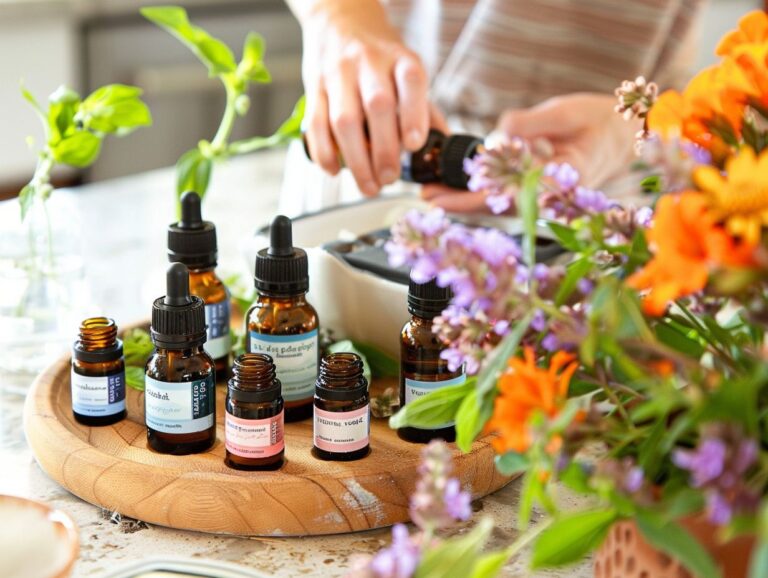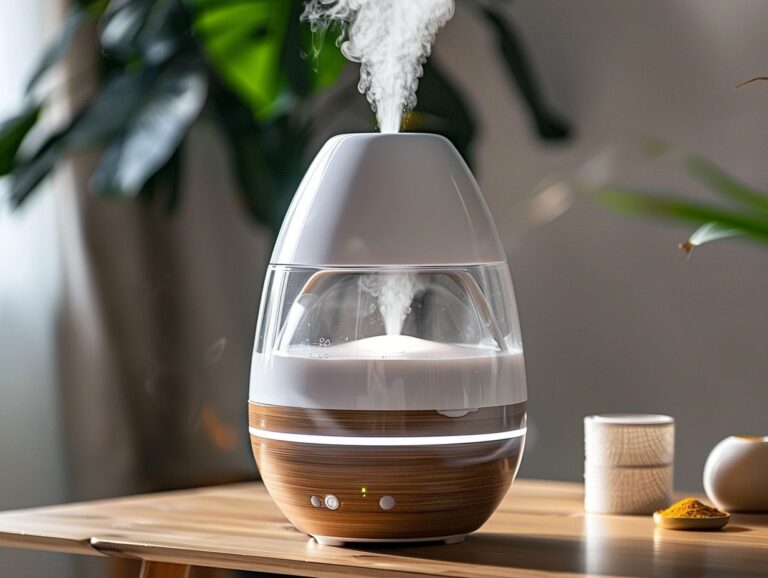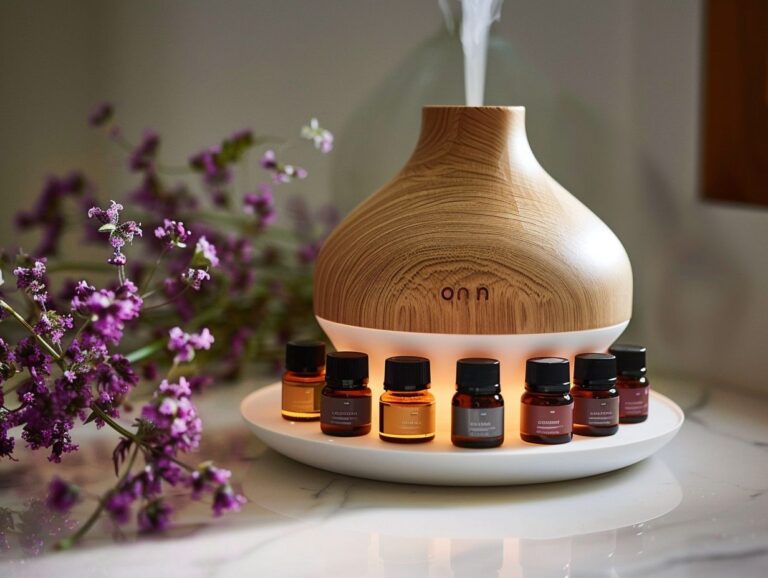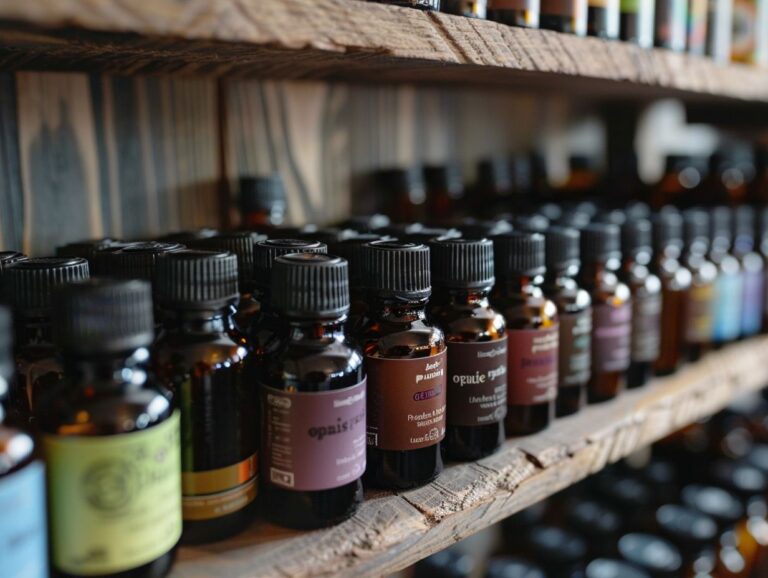How Many Essential Oil Drops in Diffuser
Are you curious about essential oil diffusers and how they work? Wondering about the benefits of diffusing essential oils and how to do it safely? Look no further!
In this article, we will explore what diffusers are, how they work, the different types of essential oils available, and the proper number of drops to use in your diffuser.
We will also discuss the benefits of diffusing essential oils, safety precautions to keep in mind, and essential oil diffuser sizes for optimal results.
Let’s dive in!
Key Takeaways:
What Is a Diffuser?
A diffuser is a device that disperses essential oils into the air, allowing you to enjoy the aromatic benefits of your favorite scents.
These devices are designed to create a relaxing and calming atmosphere in any room. By breaking down the essential oils into tiny molecules and dispersing them into the air, a diffuser helps to improve indoor air quality while adding a pleasant fragrance to the surroundings. Whether you prefer a mist, vapor, or gentle scent, you can adjust the settings on the diffuser to suit your preferences. Diffusers are beneficial for enhancing the ventilation in a space, promoting a sense of well-being and tranquility.
How Does a Diffuser Work?
A diffuser works by breaking down essential oils into tiny molecules that are then dispersed into the air, creating a fragrant atmosphere in the room.
These tiny molecules, once released into the air, emanate a subtle and continuous aroma that can effectively influence the ambiance of a space. By using specially designed blends of essential oils, diffusers can offer a variety of scents, catering to different preferences and moods. The concentration of the essential oil blend plays a crucial role in determining the strength and longevity of the fragrance, ensuring that the room is filled with a pleasant and inviting scent. This harmonious fusion of scents and dispersion method creates an inviting and soothing environment for individuals to relax and unwind.
What Are Essential Oils?
Essential oils are natural oils extracted from plants that carry the distinctive aroma and properties of the source plant, providing a pleasant scent in any room.
These oils are derived through various methods like distillation or cold-pressing, ensuring the purity of the extracted essence.
Many essential oils are known for their therapeutic benefits and can be used individually or blended together to create custom scents. Learn how many drops of essential oil in Doterra Touch.
When creating your blend, remember to start with a carrier oil and slowly add drops of different essential oils to achieve your desired fragrance.
For optimal dispersal of the scents, consider using an oil diffuser that will evenly distribute the aroma throughout your space.
What Are the Different Types of Essential Oils?
There are various types of essential oils available, each offering unique blends and scents that can create a refreshing ambiance in any room.
Some essential oils are perfect for small spaces, like offices or bathrooms, due to their compact size and potent aroma. On the other hand, oils like lavender and cedarwood work wonders in larger areas like living rooms which require more diffusion.
The ventilation in a room also plays a vital role in dispersing the aroma effectively. For closed spaces, consider using a diffuser to evenly distribute the oils, while for well-ventilated areas, simply adding a few drops to a bowl of hot water can work wonders.
How Many Essential Oil Drops Should I Put in My Diffuser?
Determining the right amount of essential oil drops for your diffuser depends on factors like the size of the room and the desired scent concentration.
When considering the number of oil drops to use, it’s crucial to take into account the room size to ensure the fragrance disperses evenly. In a larger room, you may need more drops compared to a smaller space to achieve the desired aroma level. Ventilation plays a key role in how potent the scent will be – a well-ventilated room may require more drops to maintain the aroma. Always prioritize health concerns too, as using an excessive amount of oils can lead to overpowering fragrances that may cause discomfort.
How to Determine the Right Number of Drops for Your Diffuser?

To find the ideal number of drops for your diffuser, start with a small amount and adjust based on the room size, ventilation, and your personal health considerations.
Begin by ensuring the quality of the essential oil you are using, as stronger oils may require fewer drops to achieve the desired effect. It is recommended to consult the product label or manufacturer’s instructions for specific guidelines. When determining the amount, consider the space where you are diffusing the oil – a larger room may require more drops for effective coverage.
- Take into account the ventilation in the room, as poor air circulation may necessitate slightly more drops to ensure the aroma reaches all corners.
- Consider any health effects or sensitivities you may have. It’s crucial to start with a minimal amount, especially if you are new to essential oils or have allergies.
- Observe how you react to the scent and adjust the number of drops accordingly. Too many drops can overwhelm and even cause headaches, so it’s essential to find the right balance for a pleasant diffusion experience.
What Are the Benefits of Diffusing Essential Oils?
Diffusing essential oils offers a range of benefits, including aromatherapy, air purification, mood enhancement, and relief from respiratory issues, transforming the ambiance of any room.
One of the advantages of using essential oils in a diffuser is the ability to blend different oils to create a personalized aroma that suits your preferences. By adding just a few drops of your favorite essential oils, you can fill the space with a delightful scent that not only freshens the air but also provides therapeutic benefits. The practice of using essential oils in a diffuser is known to elevate the mood, reduce stress and anxiety, and promote overall well-being.
Aromatherapy
Aromatherapy through essential oils helps create a soothing environment, promoting relaxation and overall well-being with a curated blend of scents.
Experts in the field often emphasize the powerful effects of scent on one’s system , illustrating how certain fragrances can stimulate different emotions and impact our mental state. The olfactory system, responsible for our sense of smell, plays a vital role in how our bodies respond to these aromatic molecules.
Air Purification
Using essential oils for air purification in a room can help eliminate airborne pathogens and enhance indoor air quality with natural scents.
Diffusing essential oils in a room can not only cleanse the air but also reduce unpleasant odors, creating a fresher environment. The size of the space will determine the amount of oil needed for effective purification. The effects of essential oils go beyond just masking odors; they can actually neutralize harmful substances in the air, making it safer to breathe. Investing in a quality essential oil diffuser can transform your living space into a tranquil oasis, promoting relaxation and well-being.
Mood Enhancement
Essential oil blends can uplift or relax moods, depending on the chosen scents, offering a personalized approach to enhancing the atmosphere in a room.
Blending essential oils is an art that allows you to create custom combinations to suit your needs. For example, combining lavender and bergamot can promote relaxation and reduce stress levels, great for unwinding after a long day.
On the other hand, a blend of lemon and peppermint can invigorate and boost energy, ideal for a morning pick-me-up. It’s essential to use high-quality oils for the best results as the fragrance and health benefits are directly impacted by the quality of the oils you choose.
Relief from Respiratory Issues
Certain essential oil blends can help alleviate respiratory problems such as congestion or coughing, providing natural relief and improving breathing in the room.
One popular essential oil blend recommended for respiratory health is a combination of eucalyptus, peppermint, and tea tree oils. Eucalyptus oil is known for its decongestant properties, peppermint oil helps in clearing sinuses, and tea tree oil has antibacterial effects, making it a powerful trio for respiratory support.
Quality is paramount when choosing essential oils for respiratory purposes to ensure their efficacy. Opt for pure, therapeutic grade essential oils from reputable brands to experience the full benefits.
By inhaling these oils through diffusion, they can support the respiratory system by opening up airways, reducing inflammation, and promoting easier breathing, making them a valuable addition to your wellness routine.
What Are the Safety Precautions for Using Essential Oils in a Diffuser?

Proper dilution is crucial to prevent skin irritation or other adverse reactions. To achieve this, mix just a few drops of essential oil with a carrier oil in the diffuser. Quality oils not only ensure a pleasant fragrance but also support your health. Always opt for pure, therapeutic-grade oils to maximize the benefits.
Health considerations should guide your choices, as some oils can affect certain medical conditions. Before diffusing, research potential effects of specific oils to prevent any negative reactions. It’s also vital to avoid overpowering scents as they may trigger headaches or sensitivities.
Dilute Essential Oils Properly
Properly diluting essential oils with a carrier oil before diffusing ensures safe usage and maximizes the benefits without overwhelming the space with concentrated scents.
Regarding selecting the right carrier oil, opt for neutral-scented options like grapeseed, sweet almond, or jojoba oil as they blend well with most essential oils, enhancing the overall aroma without altering its properties. Remember,
quality standards
matter; choose pure, organic carrier oils to ensure a better diffusion experience. Consider the size of the room where you’ll be diffusing the oils – for smaller spaces, a few drops are sufficient, while larger rooms may require more to effectively distribute the
aroma
. Proper
ventilation
is also key to evenly dispersing the scents without overwhelming the air.
Use High-Quality Essential Oils
Opting for high-quality essential oils ensures a pure and potent fragrance experience while minimizing the risk of adverse reactions or compromised scent quality in the room.
When selecting essential oils for your oil diffuser, it’s essential to consider renowned brands like doTERRA, Young Living, and Plant Therapy for their superior quality and therapeutic benefits. Premium essential oils not only enhance the aroma diffusion process but also have a longer-lasting effect, requiring fewer drops to achieve the desired scent intensity. The purity of the oil greatly influences its ability to disperse evenly, impacting the overall ambiance of the room. Factors such as extraction methods, sourcing, and organic certification play a crucial role in ensuring the highest quality fragrances.
Avoid Diffusing Certain Oils Around Children and Pets
Some essential oils may have adverse effects on children or pets when diffused, so it’s crucial to identify and avoid such oils to maintain a safe and healthy room environment.
Regarding selecting oils for diffusion around vulnerable individuals, diligence is key. Certain oils like eucalyptus, wintergreen, and camphor can be harmful to children and pets if not used cautiously. These oils contain potent components that might cause respiratory issues, skin irritation, or even toxicity when inhaled or ingested.
It’s advisable to create a safe blend using milder oils like lavender, chamomile, or citrus blends. Just a few drops of these oils in the diffuser can still promote relaxation and support overall health without posing risks.
How Long Should I Run My Diffuser?
The duration of diffuser operation depends on the essential oil’s potency and the size of the room, with shorter intervals recommended for stronger oils and longer intervals for milder scents.
When choosing the ideal running time for your diffuser, consider the square footage of the room. For smaller spaces, a running cycle of 30-60 minutes every 2-3 hours might suffice to maintain a pleasant aroma without overwhelming the senses. Conversely, larger rooms may benefit from longer intervals of 60-90 minutes every 3-4 hours to ensure consistent fragrance diffusion.
Pay attention to the concentration of the essential oil blend you are using. If the blend is highly concentrated, a shorter running time can still deliver a potent scent that fills the room effectively. On the other hand, a diluted blend might require more extended operation periods to achieve the desired level of fragrance intensity.
Shorter Intervals for More Potent Oils
Potent essential oils require shorter diffusing intervals to prevent overpowering the room with strong scents, ensuring a balanced and pleasant aromatic experience.
When using powerful essential oils, their concentrated nature can easily overwhelm a space if diffused for long periods. The intensity of these oils means that only a small amount is needed to fill the room with a rich fragrance. Opting for smaller diffusing intervals allows the scent to disperse gradually, maintaining a harmonious level throughout the environment.
It’s essential to consider the quality of the essential oils, as pure and high-grade oils will have a more potent scent profile. The size of the room plays a significant role in how quickly the fragrance spreads. For larger spaces, you may need to adjust the diffusion time to ensure an even distribution of the aroma.
Longer Intervals for Milder Oils

Milder essential oils can be diffused at longer intervals to gently enhance the room’s ambiance with subtle scents that create a soothing and relaxed atmosphere.
When diffusing mild essential oils, a common guideline is to choose diffusers that have longer run times, allowing the oils to disperse gradually rather than in intense bursts. This slower diffusion pace not only extends the longevity of the oils but also ensures a more subtle and continuous release of fragrance that promotes a sense of tranquility.
Amount is crucial when diffusing in larger spaces; using a bit more oil can help maintain the aroma’s potency throughout the room. It’s essential to consider individual health conditions and sensitivities, as the prolonged exposure to certain essential oils in a diffuser may have varying effects on different individuals.
Frequently Asked Questions
How Many Essential Oil Drops in Diffuser
1. How many drops of essential oil should I put in my diffuser?
Answer: The recommended amount of essential oil drops in a diffuser varies depending on the size of your diffuser. Generally, a good rule of thumb is to use 3-5 drops of essential oil for every 100ml of water in your diffuser.
2. Can I mix different types of essential oils in my diffuser?
Answer: Yes, you can mix different types of essential oils in your diffuser. This can create unique and personalized scents, but make sure to follow the recommended amount of drops for each individual oil.
3. What happens if I put too many essential oil drops in my diffuser?
Answer: Putting too many essential oil drops in your diffuser can result in an overpowering scent that may cause headaches or irritate your respiratory system. It is important to follow the recommended amount of drops to achieve a safe and pleasant scent.
4. How often should I change the essential oil drops in my diffuser?
Answer: It is recommended to change the essential oil drops in your diffuser every 4-6 hours to maintain a consistent and fresh scent. However, this may vary depending on the strength and type of essential oil used.
5. Is it safe to use essential oil drops in a diffuser around pets?
Answer: While some essential oils can be harmful to pets, there are also many that are safe to use in a diffuser around them. It is important to do research and consult with a veterinarian before using essential oils around pets.
6. Can I use less essential oil drops in my diffuser for a lighter scent?
Answer: Yes, you can use fewer drops of essential oil in your diffuser for a lighter scent. It is important to note that using too few drops may result in a weak or barely noticeable scent. Adjust the amount of drops based on your personal preference.








2 Comments